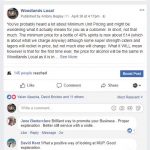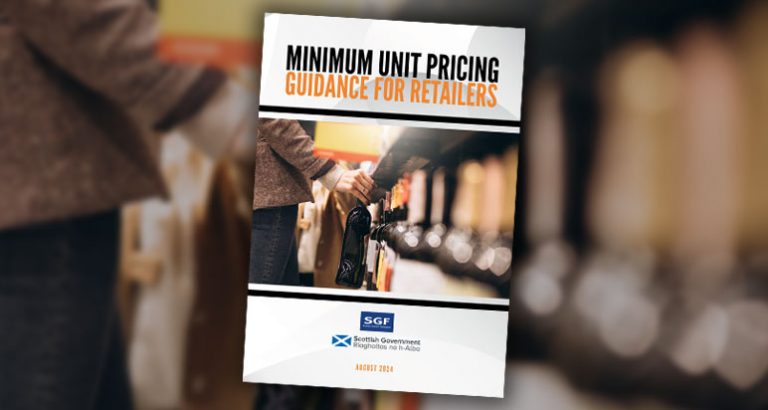Once derided as yet more unnecessary and ineffective nanny state red tape, Minimum Unit Pricing (MUP) is increasingly looking like the biggest opportunity to land in local retailers’ laps for years.
by Antony Begley
When news first broke that Scotland was to go it alone and introduce a minimum unit price for alcohol, the general reaction from the local retailing industry was, frankly, far from positive. It was viewed by many as yet more unnecessary legislation that would cause more headaches for retailers while failing miserably to achieve the public health improvement goals set out for it.
We’ve been here so many times before, of course, so that reaction was only to be expected. The Scottish Government has a fair bit of previous when it comes to introducing new legislation that appears to have been hastily conceived, drafted and then passed into law before it was actually fit for purpose.
The Scottish Government’s commitment to being seen as proactive and innovative in relation to public health is in many ways commendable, but there is a strong suspicion in many quarters that speed is often prioritised above quality when it comes to drafting new legislation. The Government appears more interested in being first than getting it right. This has been particularly true of recent tobacco and alcohol legislation.
So when Minimum Unit Pricing first reared its head it appeared that the clock was already ticking, as the Scottish Government set its heart on becoming the first nation on earth to introduce MUP. In the meantime, the industry was slowly coming around to the realisation that MUP, rather than being a blight, might actually represent a massive opportunity for local retailers. For the first time, convenience stores and supermarkets would find themselves on a legally-binding level playing field in terms of alcohol pricing.
Problem drinking
Doubts remain as to just how effective MUP will be in tackling problem drinking. Work an evening shift in any convenience store in Scotland, for instance, and it will be very clear that MUP is more likely to make problems drinkers change what they drink than it is to stop them drinking altogether – and it may even force some down an even less palatable avenue into drugs and crime. But putting that wider societal issue to one side, the bulk of local retailers now appear to view MUP as a gilded opportunity to steal back some ground from the supermarkets and discounters.
“As far as I can see, MUP is a brilliant opportunity for local retailers in Scotland because it means we can now compete fairly with Tesco and Aldi on alcohol,” says Scott Graham of McLeish’s in Inverurie. “Why would customers jump in their car to drive to a supermarket for a case of beer or a bottle of vodka when they can get it round the corner from their house at my store for the same price? And why would they want to buy a case of beer they don’t really need anyway when they can get four cans out of the chiller from me at the same pro-rata price? It’s a real opportunity but it’s up to us to make the best of it by making sure our customers know that the pricing is now more or less the same regardless of where they go.”
The issue of communicating the importance of the changes to customers is one that Dennis Williams, SGF President and owner of Broadway Convenience Store in Edinburgh picks up on: “I think customers will realise soon enough that the days of dirt-cheap cases of beer and bottles of vodka for a tenner are over at the mults and discounters, but we can accelerate that learning by communicating with them ourselves.
“By explaining to customers what MUP means, either face-to-face or by social media or whatever, we can help show them that there’s no need for them to go to a supermarket or a discounter if it’s alcohol they’re looking for.”
That’s the strategy we adopted in our Woodlands Local store in Falkirk. We explained the impacts of MUP on the store’s Facebook page, and why people should shop locally rather than in a major multiple because the pricing is now the same. The response from customers was entirely positive.
“Our experience of MUP so far is that customers understand it’s happening, understand why and aren’t blaming retailers for it, so that’s all been pretty smooth,” says Scott Graham. “They understand it’s health-driven and they largely buy into it, so it’s helped make the transition a relatively smooth one. It also helps that MUP hasn’t actually affected too many products in my store.”
Scott’s experience is typical, with many retailers reporting that they only had to change the price of half a dozen products in-store, typically Strongbow Cider, Lambrini, some PMP value spirits and, of course, Frosty Jack. This more than tripled in price overnight, along with other super-strength white ciders.
Opportunity knocks
For many retailers, MUP could present a world of opportunities, as highlighted by C&C off-trade Sales Director Norman Loughery: “C&C commissioned detailed consumer research ahead of MUP’s implementation. This highlighted a range of opportunities for independent retailers to consider.
“Under MUP there is no pricing benefit to purchasing alcohol in supermarkets, we therefore expect, over time, a shift in consumer habits that will see drinkers purchasing smaller size packs, as well as purchasing more frequently. With this in mind, independent retailers are likely to see an increase in consideration of alcohol from shoppers, providing them with an opportunity to drive purchase, particularly as our research shows that consumers view a ‘convenient location’ and ‘good range of products’ as the most important considerations for shopping after price.
“Our research also highlighted that the majority of shoppers are likely to spend the same amount on alcohol, with key price points that retailers should look to hit being £5, £10 & £15. Packs crossing these thresholds are likely to suffer disproportionate volume losses. No price incentive on large packs, will see their removal, with small and mid-packs becoming key to category sales. Without the ability to use price to differentiate from market leaders, weaker brands are likely to lose out; we recommend rationalising slow sellers and weaker performers in order to dedicate sufficient space to selling Scotland’s favourite brands – like Tennents Lager & Magners Cider.
“With no ability to discount below the Minimum Unit Price, an increased focus on what the consumer values, will be crucial for retailers. Over half of beer and cider is consumed (in part) on day of purchase. By maximising chilled space on best-selling packs, retailers will sell the products Scots are looking for, chilled and ready for (near) immediate consumption. This will improve perceived value, and entice consumers to come back time and time again.”
KeyStore More Peterhead retailer Garry Haigh also believes that MUP will result in a shift away from price as the big selling point for alcohol, with the emphasis now likely to shift onto a better range of interesting, high quality products which will present a fresh opportunity for local retailers.
He told SLR: “For years the vast majority of alcohol sales were all about price. Cases of beer for a tenner at Tesco, bottles of spirits for £9, that sort of stuff. But now that nobody can do cheap alcohol, the focus has got to move away from price because retailers will have to find different ways of differentiating themselves from each other. That gives independent retailers a real advantage because they can move quicker and try things quicker in response to evolving shopper trends. Things like craft beers and gins, locally-sourced drinks, premium products and so on. That’s got to be a good thing for us.”
Acid test
The acid test, believes Dennis Williams, will be Christmas this year. He says: “By Christmastime customers will understand MUP well and I’m hoping we’ll see a bit of a resurgence in the local retailing trade because the supermarkets and discounters won’t be able to use alcohol as a loss-leader to drive footfall the way they’ve done for many years. If we can convert even a percentage of those shoppers to customers of ours at Christmas, it could be a very festive period indeed.”
The lesson here is clear, then. Communicate frequently and well with your customers to let them know that there is no benefit to buying beers, wines, ciders or spirits at the supermarket – and begin the process of building a tailored range that will give your customers reason to choose your store first. Opportunities like this don’t come along very often. It’s vital we grab this one by the throat.
Meanwhile in Carlisle…









